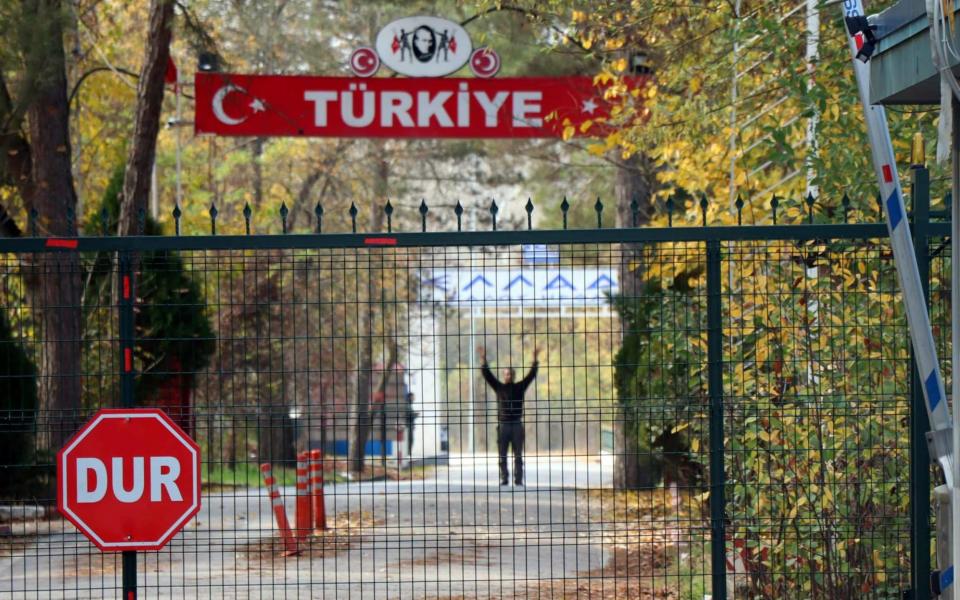UK braced for influx of jihadis from Turkey, after Ankara announces deportation of Briton held for a year

Britain is braced for the return of dozens of home-grown Islamic State fighters after Turkey yesterday began the process of sending back captured UK citizens.
Turkey announced yesterday it was deporting a British jihadist fighter signalling a change of policy that threatens the UK strategy of leaving terrorists to fester abroad.
Hours later the suspect, a 26-year-old British citizen, was arrested on suspicion of preparation of terrorism offences after arriving at Heathrow airport on a flight from Turkey. The maximum sentence if charged and found guilty is life in prison.
The threat of battle-hardened terrorist fighters being sent back to Britain in the coming months will cause concern for authorities.
The deportation took place a week after Turkey’s interior minister declared his country was “not a hotel for Isil members”.

It is understood that officers from the Metropolitan Police’s counter-terrorism team flew to Turkey and escorted the man back on a commercial flight. The suspected jihadist had attempted to travel to Syria at the start of the year but was apprehended in Turkey before he could cross the border and reach the Islamic State, according to well placed sources. He had been in Turkish custody ever since. Although Turkish authorities described him as a “foreign fighter”, sources in the UK questioned if he had ever seen any action and downplayed his threat now he is back on British soil.
It is estimated that at least 50 Britons are being held in Turkey, among them Aine Davis, 37, who is suspected of being a member of the notorious gang of British jihadis - including Mohammed Emwazi, known as ‘Jihadi John’, who beheaded UK and US hostages.
Davis was jailed for seven and a half years for terrorism offences at a trial held outside Istanbul in 2017. Two other members of the gang Alexanda Kotey and El Shafee Elsheikh are being held by US authorities in Iraq.
The unusual decision taken by Ankara to publicise the deportation of the British jihadist - along with seven German Isil suspects back to Berlin - sends out the strongest possible message it will no longer tolerate holding onto foreign fighters. The change of policy forces responsibility onto the host nations.
It is reckoned that about 1,200 foreign-born Isil fighters are being held in Turkey of whom ‘several dozen’, according to sources, are from the UK. The Government in London has stripped a number of jihadists of their UK citizenship, among them Kotey and Elsheikh, who face the death penalty if tried in the US. Others include Shamima Begum, one of a number of British schoolgirls who travelled to Syria and because Isil brides.
More than 900 Britons have travelled to Syria to join Isil, of whom 20 per cent have been killed and 40 per cent have already returned to the UK.
A number have been kept out of Britain on temporary exclusion orders, preventing their deportation from Turkey. Others who come back to the UK and who are judged a security risk, can be subjected to a terrorism prevention and investigation measure - known as a TPIM - which allows court-ordered curfews and other restrictions. Turkey has been signalling for weeks that it intends to send back foreign ISIL members to Europe, even if European governments refused to take them back.

“We are not a hotel for Isil members from any country,” said Suleyman Soylu, Turkey’s interior minister on November 4.
Mr Soylu has been critical of the UK for stripping British Isil members of their citizenship in order to prevent them from returning home.
“When there is a Daesh member, they cancel his or her citizenship, making the person stateless. Then, they take no responsibility,” he said. “That is not acceptable to us. It’s also irresponsible.”
Most of the detainees were intercepted by Turkish security services as they tried to make their way through Turkey to Syria. Around 287 foreign Isil members have been captured inside Syria since the start of Turkey’s military offensive against the Kurds in October. The largest groups of foreign nationals are from Iraq, Syria, and Russia.
Turkey began the deportations this week with Muhammad Darwis Bassam, a 39-year-old US citizen. The US had refused to take Mr Bassam and so Turkish authorities tried to send him to Greece and deposited him at a Greek border checkpoint on Monday.
Greek authorities refused to allow him, leading to a bizarre stalemate which saw the alleged jihadist waiting for three days in no-man’s land between Greece and Turkey. Turkish guards gave him food and let him sleep in a car.
The diplomatic standoff appears to have been resolved during a meeting between Donald Trump and Recep Tayyip Erdoğan, Turkey’s president, at the White House on Wednesday. Soon after the meeting, the US agreed to take Mr Bassam back.
At the same time the British jihadist was sent to London, Turkey deported six Germans - two men and four women - while it also plans to expel 11 French citizens and two Irish in the coming days.
Prosecutors in Berlin said the returning Germans would not face immediate arrest on arrival. Two of the deportees who claim they travelled to Syria as Isil brides face a full investigation on their return to Germany and will be subject to travel restrictions and police monitoring.

 Yahoo News
Yahoo News 